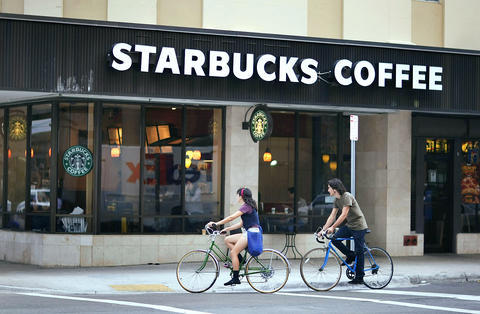Americans had to cope without blended Frappuccino and blueberry coffee cake for a few hours yesterday as Starbucks shut its 7,100 company-owned stores for a nationwide barista training session.
Starbucks chairman Howard Schultz had ordered the unprecedented three-hour afternoon closure as part of an effort to improve coffee quality and revive the chain's flagging fortunes.
And it prompted frenzied action by competitors hoping to snatch Starbucks customers. Dunkin' Donuts declared yesterday a cut-price coffee day with prices slashed to US$0.99 so that "no coffee lover is denied a delicious espresso-based beverage."

PHOTO: AFP
During the session, Starbucks' baristas were to get a "hands-on espresso training experience."
In a letter to staff, Schultz said: "Starbucks partners will have an opportunity to connect and deepen their passion for coffee with the ultimate goal of transforming the customer experience."
Schultz, the architect of Starbucks' growth during the 1990s, returned to hands-on management last month after shareholder unrest triggered the departure of chief executive Jim Donald.
The company's shares dived 42 percent last year on signs that consumers were falling out of love with Starbucks. Investors were alarmed by figures showing a 1 percent fall in the average number of transactions per store.
In a raft of changes aimed at restoring momentum, Starbucks is cutting 600 jobs, introducing free wireless Internet connection and axing hot breakfast sandwiches, which were criticized for interfering with the aroma of coffee.
Shultz said he wanted to restore an "emotional connection" with customers. But the shutdown was mocked by independent coffee stores that had long suffered under the shadow of Starbucks.
Coffee Klatch, a small Los Angeles outfit, said it would offer free coffee to all customers while its bigger rival goes dark.
"I'm not sure why it's going to take them three hours to learn how to press a button," said Coffee Klatch's owner, Mike Perry, who described his own beverages as "expertly crafted" in contrast to Starbucks' machines.
Britain's Starbucks outlets was not affected by the closure. The chain's international stores are faring better than those in the US.

The paramount chief of a volcanic island in Vanuatu yesterday said that he was “very impressed” by a UN court’s declaration that countries must tackle climate change. Vanuatu spearheaded the legal case at the International Court of Justice in The Hague, Netherlands, which on Wednesday ruled that countries have a duty to protect against the threat of a warming planet. “I’m very impressed,” George Bumseng, the top chief of the Pacific archipelago’s island of Ambrym, told reporters in the capital, Port Vila. “We have been waiting for this decision for a long time because we have been victims of this climate change for

Rainfall is expected to become more widespread and persistent across central and southern Taiwan over the next few days, with the effects of the weather patterns becoming most prominent between last night and tomorrow, the Central Weather Administration (CWA) said yesterday. Independent meteorologist Daniel Wu (吳德榮) said that based on the latest forecast models of the combination of a low-pressure system and southwesterly winds, rainfall and flooding are expected to continue in central and southern Taiwan from today to Sunday. The CWA also warned of flash floods, thunder and lightning, and strong gusts in these areas, as well as landslides and fallen

MASSIVE LOSS: If the next recall votes also fail, it would signal that the administration of President William Lai would continue to face strong resistance within the legislature The results of recall votes yesterday dealt a blow to the Democratic Progressive Party’s (DPP) efforts to overturn the opposition-controlled legislature, as all 24 Chinese Nationalist Party (KMT) lawmakers survived the recall bids. Backed by President William Lai’s (賴清德) DPP, civic groups led the recall drive, seeking to remove 31 out of 39 KMT lawmakers from the 113-seat legislature, in which the KMT and the Taiwan People’s Party (TPP) together hold a majority with 62 seats, while the DPP holds 51 seats. The scale of the recall elections was unprecedented, with another seven KMT lawmakers facing similar votes on Aug. 23. For a

All 24 lawmakers of the main opposition Chinese Nationalists Party (KMT) on Saturday survived historical nationwide recall elections, ensuring that the KMT along with Taiwan People’s Party (TPP) lawmakers will maintain opposition control of the legislature. Recall votes against all 24 KMT lawmakers as well as Hsinchu Mayor Ann Kao (高虹安) and KMT legislative caucus whip Fu Kun-chi (傅崐萁) failed to pass, according to Central Election Commission (CEC) figures. In only six of the 24 recall votes did the ballots cast in favor of the recall even meet the threshold of 25 percent of eligible voters needed for the recall to pass,